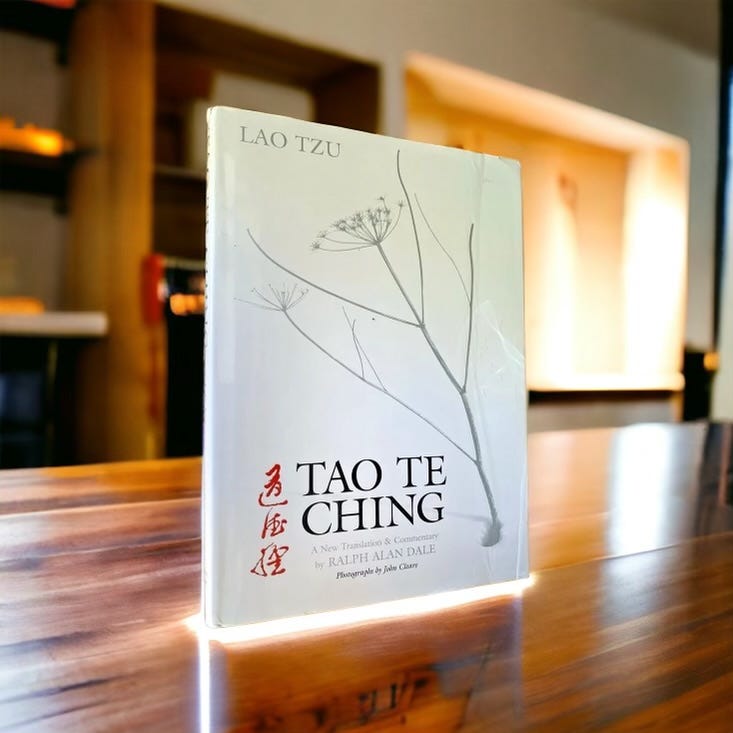The Tao Te Ching, a foundational text of Taoism, has captured the imagination of scholars and seekers alike for centuries. Among the many interpreters and commentators who have ventured into the profound realms of the Tao Te Ching, Ralph Alan Dale stands out for his unique emphasis on what he calls "The Great Integrity."
But first, a little about Ralph Alan Dale, a scholar and author known for his deep insights into Taoism and the Tao Te Ching. Born in 1930, he dedicated a significant portion of his life to studying and interpreting this timeless philosophical and spiritual masterpiece. Dale's approach to the Tao Te Ching was characterized by a focus on what he termed "The Great Integrity," a concept that lies at the heart of Laozi's teachings.
At the core of Dale's interpretation was the belief that The Great Integrity represents the essence of the Tao Te Ching. He saw it as the unifying principle that connects all aspects of life and existence. According to Dale, The Great Integrity encompasses harmony, balance, and the unbroken unity of the Tao. It is the source from which all virtues and wisdom emanate.
Dale's writings on The Great Integrity emphasize the importance of aligning one's life with the fundamental principles of the Tao. He saw Laozi's teachings as a guide for individuals to harmonize with the natural order of the universe. For Dale, The Great Integrity was not an abstract concept but a practical philosophy that could be applied to everyday life.
One of the key aspects of Dale's interpretation was the idea that The Great Integrity is not something external to us but is inherent within each person. He believed that individuals possess an innate connection to the Tao and that recognizing this connection is essential for living a fulfilled and meaningful life.
It’s here where Dale encouraged his readers to look inward and cultivate their inner wisdom to align with The Great Integrity.
Dale's work on the Tao Te Ching was marked by a clarity and accessibility that resonated with a wide range of readers. He had a talent for distilling complex philosophical ideas into practical wisdom that people could apply in their daily lives. His books, including "The Tao Te Ching: A New Translation and Commentary" continue to inspire and guide seekers on their spiritual journeys.
One of the notable contributions of Dale was his exploration into how The Great Integrity can be applied in various aspects of life, from personal relationships to societal dynamics. He emphasized the importance of compassion, humility, and simplicity as pathways to embodying The Great Integrity.
While often compared, "The Great Integrity" as interpreted by Ralph Alan Dale in the context of the Tao Te Ching and the biblical "Garden of Eden" from Judeo-Christian tradition are two distinct philosophical and religious concepts with some notable similarities and differences. Here's a comparison and contrast between them
Similarities
Harmony and Balance: Both concepts emphasize the idea of living in a state of harmony and balance. In The Great Integrity, this balance is achieved by aligning with the natural order of the universe, while in the Garden of Eden, it represents a state of perfect harmony between humans and the divine.
Unity: Both The Great Integrity and the Garden of Eden symbolize a sense of unity. In The Great Integrity, it is the unity of all things within the Tao, while in the Garden of Eden, it's the unity between humanity and God before the fall.
Inherent Goodness: Both concepts suggest an inherent goodness or purity. In The Great Integrity, individuals are believed to possess innate wisdom and goodness when aligned with the Tao, while in the Garden of Eden, Adam and Eve are created in the image of God and initially experience a state of innocence.
Differences
Religious and Cultural Context: The Great Integrity is a concept rooted in Taoist philosophy, which originated in ancient China. It's a fundamental principle of Taoism. On the other hand, the Garden of Eden is a narrative found in the Bible and is central to Judeo-Christian beliefs. These concepts arise from different religious and cultural backgrounds.
Original Sin: A significant contrast is the concept of original sin associated with the Garden of Eden. In the Judeo-Christian tradition, Adam and Eve's disobedience in the Garden led to the expulsion from Eden and the introduction of original sin into humanity. In contrast, The Great Integrity does not emphasize a fall from grace or original sin but rather encourages alignment with the Tao for a harmonious life.
The Nature of the Divine: In the Garden of Eden, God is a personal and anthropomorphic deity who interacts directly with Adam and Eve. In The Great Integrity, the Tao is often described as a more abstract and impersonal principle, encompassing the natural order of the universe rather than a personal deity.
Goals and Outcomes: The goals associated with these concepts differ. In the Garden of Eden narrative, the goal is often seen as the return to a state of innocence and reconciliation with God through religious faith and redemption. In The Great Integrity, the goal is to live in accordance with the Tao, fostering wisdom, balance, and unity with the natural order.
In summary, while both The Great Integrity and the Garden of Eden convey ideas of harmony, balance, unity, and inherent goodness, they differ in their religious and cultural origins, the presence of original sin, the nature of the divine, and the ultimate goals they represent.
The Great Integrity is a Taoist concept promoting alignment with the natural order, while the Garden of Eden narrative is a Judeo-Christian story emphasizing themes of human fallibility and redemption.
In conclusion, Ralph Alan Dale's writings on The Great Integrity within the Tao Te Ching have enriched our understanding of this timeless text. His emphasis on aligning with the fundamental principles of the Tao and recognizing our innate connection to The Great Integrity has resonated with countless individuals seeking spiritual and philosophical guidance.
Dale's work continues to illuminate the path of Taoism and serves as a reminder of the enduring relevance of Laozi's teachings in our contemporary world. Through his scholarship and insights, he invites us to explore the depths of The Great Integrity and discover the profound wisdom it holds for our lives.
The concept of "The Great Integrity," as interpreted by Ralph Alan Dale in the context of the Tao Te Ching, represents a fundamental and profound principle within Taoist philosophy. It is also often referred to as "The Great Tao" or "The Great Way." To understand The Great Integrity, it is essential to explore both Dale's interpretation and the broader teachings of the Tao Te Ching.
Times are hard for so many of us these days. So if you find my nomadic wisdom valuable in helping to set a positive tone for your day, please join me as a paid member supporter.
Or feel free to tip me some dirty chai latte love here if you feel so inclined.
Every bit counts as I strive to deliver high quality feature articles into your inbox on a daily basis. Never any paywalls, just my Taoist raw thoughts which are open to everyone on what it means to be human.
Your contributions are appreciated in support of my fall time work and calling.
Much Love,
Diamond- Michael Scott — aka The Chocolate Taoist







Thanks. for this. I'll look into R.A.D.
Are you familiar with David Hinton? In both China Root and The Way of Ch'an, he does a great job of explaining how Ch'an is rooted in Taoism both historically and philosophically and of differentiating between Ch'an and classical Buddhism. He's written a lot about the Tao in a way that resonated with me.